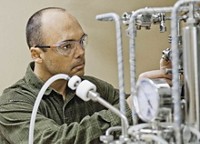Advertisement
Grab your lab coat. Let's get started
Welcome!
Welcome!
Create an account below to get 6 C&EN articles per month, receive newsletters and more - all free.
It seems this is your first time logging in online. Please enter the following information to continue.
As an ACS member you automatically get access to this site. All we need is few more details to create your reading experience.
Not you? Sign in with a different account.
Not you? Sign in with a different account.
ERROR 1
ERROR 1
ERROR 2
ERROR 2
ERROR 2
ERROR 2
ERROR 2
Password and Confirm password must match.
If you have an ACS member number, please enter it here so we can link this account to your membership. (optional)
ERROR 2
ACS values your privacy. By submitting your information, you are gaining access to C&EN and subscribing to our weekly newsletter. We use the information you provide to make your reading experience better, and we will never sell your data to third party members.
Business
On to Greener Pastures
Agricultural biotechnology still has untapped potential to change the face of farming
by AALOK MEHTA, C&EN WASHINGTON
August 22, 2005
| A version of this story appeared in
Volume 83, Issue 34
In 1996, the University of California, Davis, launched an ambitious program to capitalize on its biotechnology research clout. Pamela C. Ronald, at the time an associate professor of plant pathology at the university, had identified and cloned from native Mali rice the gene Xa21, which confers resistance to Xanthomonas oryzae, the cause of bacterial blight in the crop. Using proceeds derived from patenting and licensing the gene, UC Davis planned to give monetary assistance to the needy Mali population--with the hope of eventually providing disease-resistant rice to battle hunger and famine across Africa.
Nearly a decade later, that early optimism has yet to pan out, and the promised assistance has not reached Mali. UC Davis' plan was hindered not only by strict government regulations and public apprehension, but also by the increasingly complicated tangle of biotech patent issues.
The story illustrates the general plight of agricultural biotechnology. New breakthroughs and techniques have brought hints of solutions to some of humanity's most pressing problems and suggestions of agricultural utopia: more productive, more nutritious staple crops blessed with hardier defense systems and plants transformed into environmentally friendly pharmaceutical factories. But much of that promise has yet to materialize. In the meantime, the industry struggles with opposition from some environmental activists, increasing regulatory oversight, ethical concerns, and public mistrust.
Nevertheless, that philanthropic potential and that frontier feel of agbiotech can make it an exciting field for a chemist. "We're shifting away from a brute-force reliance on synthetic chemistry to a much more integrated approach to understanding the way biology works," says Val Giddings, Biotechnology Industry Organization's (BIO) vice president for food and agriculture. "This is a much more straightforward path to crop improvement than selective breeding.
"Plants will increasingly be adapted to have special properties and specialized nutrient values and to make specialized compounds," he adds. "And all of this will be done through biochemical means."

AGRICULTURAL biotechnology is showing the typical growth spurts of an industry in its infancy. According to "Global Status of Commercialized Biotech/GM Crops: 2004," a report released in January by the International Service for the Acquisition of Agri-biotech Applications, "In 2004, the global area of biotech crops continued to grow for the ninth consecutive year at a sustained double-digit growth rate of 20%, compared with 15% in 2003. The estimated global area of approved biotech crops for 2004 was 81.0 million hectares, equivalent to 200 million acres, up from 67.7 million hectares or 167 million acres in 2003." Biotech crops were grown by about 8.25 million farmers in 17 countries in 2004, the report says, compared with 7 million farmers in 18 countries in 2003.
"Chemistry is the essential bedrock on which the edifice of biotechnology is being constructed," Giddings says. Work is proceeding on transgenic microbes for mining and pollution control and on plant-made pharmaceuticals and enzymes, he says, and a good appreciation of chemistry in all its forms is going be critical to this activity.
"I see nothing but a rosy future for people with biochemistry background and skills," he adds. "And there will be significant opportunities for traditional inorganic chemists, too."
According to Charles J. Arntzen, founding director of the Biodesign Institute and a professor in the School of Life Sciences at Arizona State University: "Agricultural biotechnology can be divided into two broad areas. First, there is crop improvement, the traditional route. The second is specialty products: high-value pharmaceuticals from plants." Or more commonly, he says, "farming versus pharming."
Arntzen is no stranger to the inner workings of agricultural biotechnology. His work has included significant contributions on plant-based vaccines for human disease prevention. His group has successfully completed three clinical trials of human plant vaccines in raw potatoes, both for military-funded biothreat reduction and for diseases rampant in developing nations, such as human papillomavirus.
He sees a number of biotech opportunities in the near future for chemists, especially in plant-derived pharmaceuticals, such as monoclonal antibodies, cancer therapeutics, vaccines to treat animal diseases, and enzymes of various types.
The industry has seen a lot of consolidation in recent years, leaving a small number of notable mega-companies. But their success at bringing products to market is part of the appeal of an industrial job. "You get the reward of really getting to see the fruits of your labor go into something useful," Arntzen says.
Large agricultural companies typically hire at all levels for a variety of roles in product development. According to Robyn Heine, a spokesperson for Dow AgroSciences, the company looks for scientists with strong skills in the synthesis of novel targets, who can develop and articulate structure-activity relationships, and who can summarize findings and make recommendations for future research initiatives. Strong written and communication skills are always essential, she says, and Ph.D. candidates are especially desirable if they have experience working in multidisciplinary or team environments and a track record of creativity, competence, and the ability to generate new hypotheses.
There will be a number of opportunities, she adds, "in many permutations of informatics as well as in the intersection of chemistry and genomics."
As Monsanto's business has "shifted toward an agricultural business focused more on seeds and traits, we have probably hired fewer chemists lately than in previous years," says Ben Kampelman, a company public affairs associate. But the company still hires a significant number, including in areas such as crop analytics--the application of advanced analytical methods to identify the composition of seeds and products from seeds.
Kampelman adds that the company also needs process and food chemists "who can understand how products with new food and feed traits can be used in grain processing, animal feed production, and food processing." Biochemists are also in high demand in almost all aspects of biotechnology research.
Monsanto hires chemists at all levels, bachelor's through Ph.D., including for entry-level positions, says Sherri M. Brown, the company's director of technology for chemistry and animal agriculture. "We hire chemists from a variety of areas, including organic chemistry, chemical engineering, biochemistry, et cetera," she says. "We are especially interested in finding scientists with strong backgrounds in analytical chemistry, given our need for seed analysis and for a better understanding of the intricacies in the way plants work and interact with their environments." In addition, she says, "scientists with a combination of chemistry, biochemistry, or biology training are particularly valuable to us."
Scientists at the company work on improving a suite of biotech products, including low trans-fat soybean oil and corn optimized for the production of ethanol. Researchers also work with other biotech experts and breeding specialists on chemical and seed composition.
"Especially for plant improvement, this is an amazing time to be in the field," says Bruce Orman, director of analytical and genomics technologies for DuPont subsidiary Pioneer Hi-Bred's crop genetics research group. "So many technologies have come on board recently for making improvements to plant genomes and providing value to consumers."
Chemists are employed by the company at all levels in three major areas, he says. Many chemists work on plant breeding and plant genetics, but a number of biochemists and analytical chemists work on "basic research into pathway elucidation." The company's lab automation group also hires a fair number of chemists.
The work can be tough, Orman adds. With the advent of genomics, molecular markers, modeling and simulation programs, and other developments, "our suite of tools is so much greater than 10 or 20 years ago, and it's a challenge how to logically apply them. We produce so much data and so much complex data, it's difficult to simplify the data into knowledge."
But given the rapidly growing world population and increasing demand for crops, the rewards can be worth it, he says. "We are increasing productivity per unit acre without putting more acreage into use."
For Arizona State University's Arntzen, working for a large agricultural biotech company isn't necessarily the way to go. Academic research is an alternative, especially if "you really want to focus on helping the developing world and doing good for humanity," he says. "But while you have more flexibility, it can be difficult to get money."
And "some companies still focus on specialty crop items," he adds. "All these small biotech companies are tackling exciting new areas of science. They have more success in finding funding. These companies often have a very humanitarian goal in mind."
ONE EXAMPLE is Chromatin, a 23-person biotech firm based in Chicago's Hyde Park. The company works on developing chromosomes for use in crop plants, says Mich Hein, chief executive officer of the company. The firm's eventual goal is to bundle into a small chromosome a suite of useful properties--such as improved performance of crops in the field or enhanced taste or quality--and then deliver it into plant cells.
The company is small, but "we hire people across the spectrum," Hein says. "Our biggest need in chemistry is in analytical biochemistry and analytical molecular biology."
Experience in analytical methodologies, quality assurance, and quality control is especially useful, he adds. There's also "a lexicon of computer software that's become pretty important for people to learn at the molecular biology level. The ability to manage significant amounts of data on the computer and be conversant in a number of software programs is essential," he says.
"Good wet bench biochemistry skills are pretty key," he adds. "And there is a need for fundamental understanding of instrumentation--it's not enough just to be able to turn things on; you have to know them pretty well."
Good training is an essential part of landing a biotech job and of achieving success in an industry pitted with many regulatory and ethical issues. "For folks going into industry, the courses I recommend are intellectual property management and marketing and product development," Arntzen says. "In addition, I tell everyone to take a bioethics course, to understand the conflicts in the area."
Specialized training is another option. "Many of our students actually are employed and taking courses part-time. They don't want a Ph.D., but they are in a technology-intensive field and need more training," says Scott L. Diamond, director of the University of Pennsylvania Biotechnology Program, one of a handful of professional master's programs in biotech.
"We concentrate in training in a wide variety of fields--biotech, engineering, law, business, and chemistry," Diamond says. "Everyone gains a very firm basis in molecular cell biology, even if they are going into informatics." In addition, the program offers additional laboratory experience and training in biostatistics, high-throughout techniques, and manufacturing challenges. Most students also take a seminar in bioethics and business, which in part addresses issues facing biotech start-ups.
Students in the program include those interested in biomedical science who want to deepen their skills in science and learn molecular biology; scientists interested in business management, where an advanced degree is crucial; and employees of science-intensive companies, where having only a bachelor's degree can hinder career advancement opportunities.
The program offers unique advantages, Diamond says. "Biotech is so interdisciplinary; one doesn't get a classical Ph.D. in it," he says. "And it can be pretty difficult to get a Ph.D. part-time. But it's pretty straightforward to get a master's without interrupting your work."
Biotechnology is still a growing field, and chemists who enter it will face both exciting challenges at the frontier of modern technology and hairy issues of regulation, patent protection, and ethics. And they will have an opportunity to develop biotech's as-yet-unfulfilled vision of transforming human agriculture and medicine. "Most of the world is moving toward a biotechnology-based paradigm," BIO's Giddings says. "I have no doubt what the outcome will be--a greener, more biologically diverse world with a smaller human ecological footprint."








Join the conversation
Contact the reporter
Submit a Letter to the Editor for publication
Engage with us on Twitter